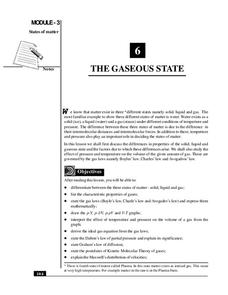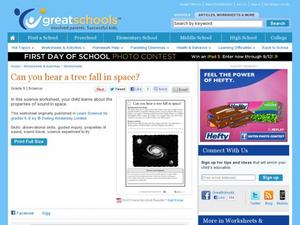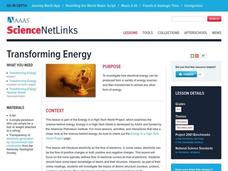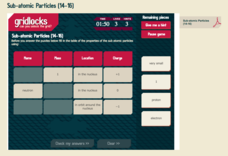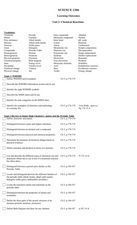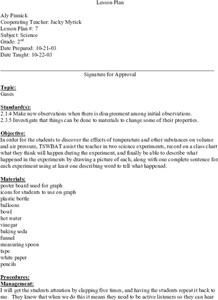Curated OER
Properties of Matter
Young scholars describe four states of matter and their characteristics, explain thermal expansion of matter, interpret state changes in terms of kinetic theory of matter, explain relationship between temperature and volume of a gas,...
Curated OER
GCSE Science-CHEMISTRY worksheet on THE NOBLE GASES - Group 0 of the Periodic Table
In this periodic table worksheet students complete a fill in the interactive set of questions using a set of vocabulary words that describe the different elements.
Curated OER
Science: Changes in Matter
Second graders discover what changes occur in various types of matter under different conditions. They make predictions about the changes in an apple left out in the air, water placed in a freezer, and a nail left in a cup of water. They...
Curated OER
Matter and Change
Bright blue slides with yellow and white font make this presentation easy for learnerrs to read. The content is a brief overview of the commonly observed physical properties of matter, focusing on the differences among solids, liquids,...
National Institute of Open Schooling
The Gaseous State
Sixth in a series of 36, this lesson focuses on gases and their behavior in given situations. Learners review the states of matter and then focus on gases, specifically learning Boyle's, Charles's, Avogadro's Laws, Dalton's, and Graham's...
University of Colorado
Looking Inside Planets
All of the gas giant's atmospheres consist of hydrogen and helium, the same gases that make up all stars. The third in a series of 22, the activity challenges pupils to make scale models of the interiors of planets in order to...
Curated OER
Evidence of Chemical Change
In this chemical change worksheet, students conduct 4 experiments set up around the room. They follow the instructions at each station for each experiment and list the physical properties and observe any changes at each station. Students...
Concord Consortium
Molecular View of a Solid
Why are solids, well ... solid? Take a peek inside a solid substance with an easy-to-use interactive. Science sleuths examine the motion and position of the atoms that make up a solid before drawing conclusions from their observations.
Curated OER
Funny Putty
Learners are introduced to the properties of solids, liquids and gases. They see that colloids are mixtures which display the properties of more than one of these states. They engage in an excellent experiment which demonstrates this fact.
Curated OER
Chemistry Foundations
Extensive notes on foundational chemistry concepts make up this resource. It summarizes the properties of matter, the periodic table, chemical nomenclature, and general chemical bonding. Design a set reading comprehension questions to go...
National Institute of Open Schooling
The Liquid State
Due to surface tension, dew — a liquid, is spherical in shape. Learners explore the properties of liquids in activity seven in this series of 36. Beginning with its basic properties such as boiling point and moving through to surface...
Curated OER
Metals and Non-metals
A half-page chart compares the properties of metals and nonmetals. Properties include appearance, melting and boiling point, density, strength, malleability, ductility, heat and electrical conductivity, and the nature of their oxides....
Curated OER
Groups of Elements
Element groups are located in the periodic table by blinking on and off. A slide is then dedicated to each of the groups, explaining which elements are included and what common chemical properties they share. This topic is presented in...
Curated OER
Can You Hear a Tree Fall in Space?
How does sound travel in space? Fifth graders investigate this question with a science activity, in which they research the properties of sound. Schedule a lab visit for individual Internet research, or include the activity after you...
LABScI
Viscosity: The Fluid Lab
There's more to fluids than meet the eye—they include gases, liquids, and polymers, too! Scholars complete three hands-on activities exploring different properties of fluids. They explore viscosity by measuring the resistance, or...
Science 4 Inquiry
Battle of the Waves
Which travels faster, light or sound? Scholars work in groups to simulate the ability for waves to travel through solids, liquids, gases, and through a vacuum. Then, they learn about the properties of a mystery wave and must determine...
Polar Trec
Ice Cores: Modeling Ice Sheets
Ice cores provide scientists with knowledge of historic melt layers, air temperatures, greenhouse gases, and climate stability. Scholars work in groups to build layers representing snow and ice over thousands of years. Then, groups...
Curated OER
Transforming Energy
Super detailed, this lesson will educate physical science learners about the flow of electrons. Begin by reviewing potential and kinetic energy with a moving pendulum, and then get them online to observe interactive websites about...
American Chemical Society
Molecules Matter
Did you know that jumping spiders sometimes wear water droplets as hats? A seventh grade science lesson introduces the concept of what makes up water: tiny molecules that are attracted to each other. Starting with a chemistry discussion,...
Royal Society of Chemistry
Sub-Atomic Particles (14-16)
In 1897, J.J. Thomson discovered the electron, the first subatomic particle proven to exist. Scholars review their understanding of electrons, protons, and neutrons as they work through the puzzles. Each puzzle connects two or three...
Curated OER
A New Phase In Town
Middle schoolers explore heat energy and how it is used to change the phase of matter, and discover that temperature does not increase or decrease until the phase change is complete. This extremely well-written plan is packed with great...
Curated OER
Matters of Milk and Marshmallows
Pupils observe a teacher demonstration o classifying matter by its physical properties of shape and size. After discussing the definition of matter, students describe the state of matter. They sing a song to the tune of "Bingo." In...
Curated OER
Learning Outcomes
In this science worksheet, learners explore the learning outcomes for a unit on chemical reactions. Students define 60 vocabulary words and answer a list of questions for each topic.
Curated OER
Gases
Second graders work with gases to determine what the effects of temperature are on volume and air pressure by working with balloons. Also, they experiment with vinegar and baking soda. They predict the outcomes of these experiments, and...






